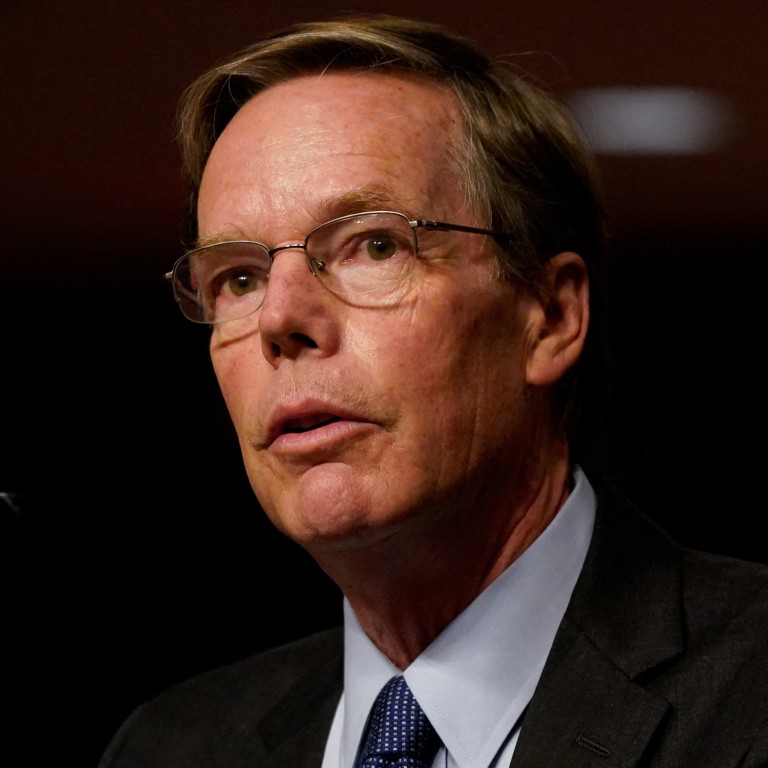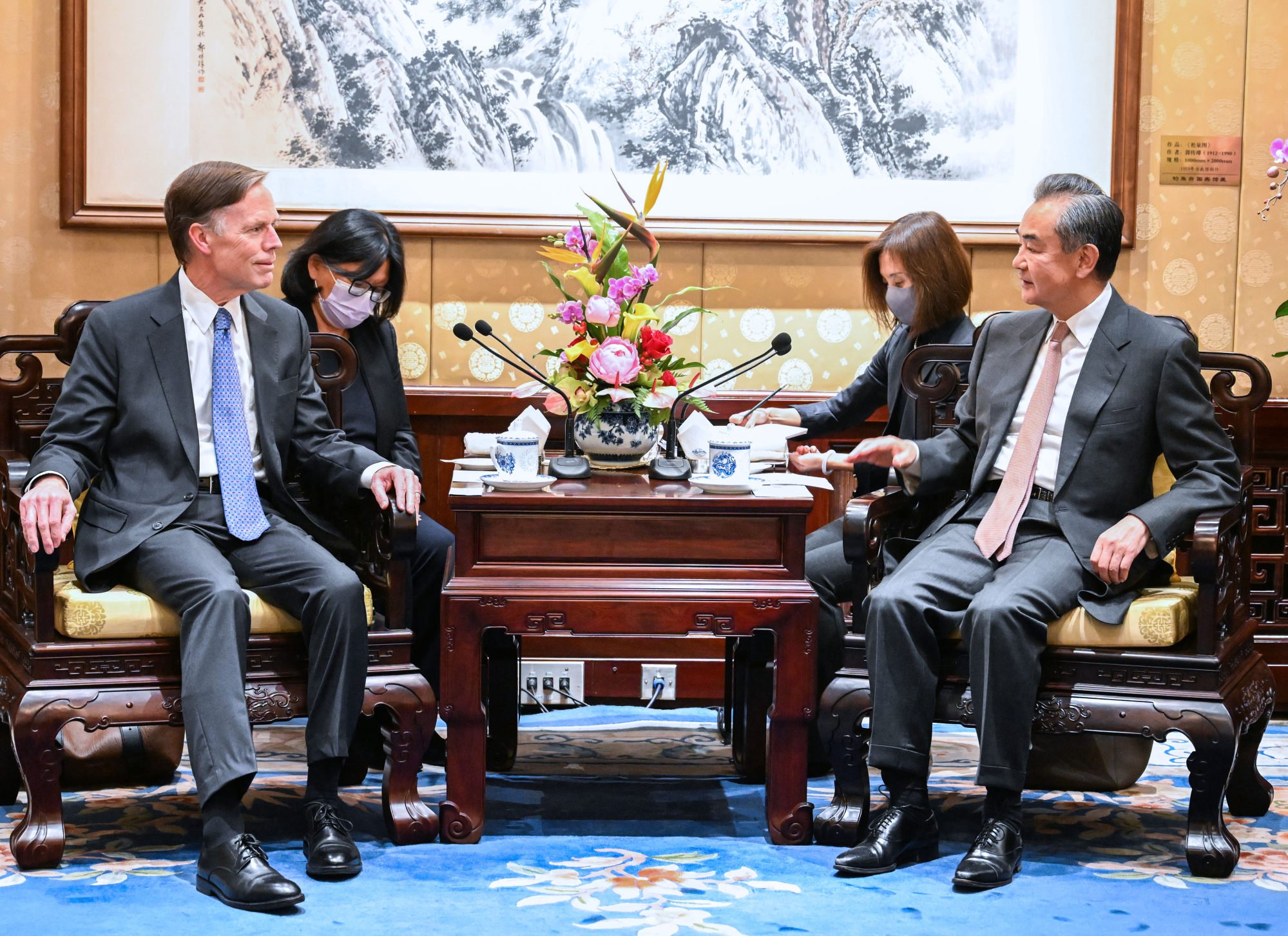
US envoy to China says next steps to improve relations are up to Beijing
- ‘We’ve never been shy of talking and we hope the Chinese will meet us halfway,’ Nicholas Burns says
- Burns’ remarks come as the US-China relationship, now characterised by deep distrust, founders over trade, Taiwan, human rights and other issues
US doors are open, the US is waiting and it is up to Beijing to make the next move to improve relations, Washington’s senior diplomat in China said on Tuesday.
Ambassador Nicholas Burns, a quarter-century veteran of the US State Department, spoke at a time when relations between the two nations have plummeted over trade, Taiwan, defence, human rights, politics and their very different visions of the global system, all marked by deep distrust.
“We need better channels between the two governments and deeper channels and we are ready to talk,” Burns said, speaking to the Stimson Centre in Washington by video from Beijing.
“And it’s particularly important to do that, of course, when you’ve got big problems and when you have major disagreements in the relationship.
“We’ve never been shy of talking and we hope the Chinese will meet us halfway.”

US-China relations have been marked by fits and starts in the two years since Joe Biden became US president.
There were wide expectations that the new administration would lower some of the punitive tariffs put in place by his predecessor Donald Trump, which has not happened.
Last August, within hours of then-House Speaker Nancy Pelosi’s visit to Taiwan, China shut down eight key dialogue channels, including talks concerning counter-narcotics, the environment and defence.
The freeze appeared to be easing after the 20th Party Congress in October. Burns met with both then-US Ambassador Qin Gang and then-Foreign Minister Wang Yi in Beijing, followed by Biden’s meeting with Chinese President Xi Jinping in Indonesia in November.
US officials dodge claims Chinese balloon was able to send data to Beijing
But further advances fell off the rails with the discovery of a Chinese surveillance balloon transiting across the US in late January – and its downing in early February – prompting Secretary of State Antony Blinken to cancel a planned trip to Beijing.
“It’s hard for me to predict at this point when this kind of reengagement will reoccur, but we have never supported an icing of this relationship,” Burns, who has been on the job for 14 months, said.
“We don’t want a conflict with China. We don’t want to return to a Cold War with China. And we need greater stability in this relationship.”
Burns said that Washington’s policy toward Taiwan – a growing source of tension with Beijing – had not changed. But he called on China to renounce the use of force in its dealing with the self-governing island.
Burns, a former ambassador to Greece and Nato, said that the foundations of any bilateral relationship were business ties and people-to-people exchanges, even as countries compete aggressively on many fronts.
But, he said, foreign companies have been unable to plan effectively: China’s zero-Covid policy prevented any US chief executives from travelling to China for three years.
The tension and shifting geopolitical landscape have also left multinational corporations wary of new commitments.
Around 1,100 US companies now operate in China: while recent surveys by the US, European and Japanese business chambers in Beijing find a majority of companies are staying put, most are unwilling to invest more at this point.
Burns said that Washington welcomed the message conveyed by the newly appointed Chinese Premier Li Qiang that China is open for business and wants to encourage the private sector, which Li added would be on an even competitive footing with state-owned companies.
Opinion: Using theory to guide US-China relations could be a recipe for disaster
But Burns noted that other policies outlined during the party congress suggested that national security and state control would trump economic issues.
“We hope that we can have an environment here where the American businesspeople and journalists and academics can feel safe, that if they’re operating here in China, they can do the jobs that they came here to do, and that they’re not subjected to this kind of intimidation,” he added.
In recent years, distrust has mounted on both sides of the Pacific. The US has grown increasingly sceptical of China’s intentions, fearful it is trying to overthrow the US-led world order.
And China is convinced that Washington is intent on holding it back and trying to encircle it, viewing recent US moves to block on military grounds exports of high-end semiconductors and chip-making equipment as a bid to frustrate its development.
This was the highest-level diplomatic meeting between the two sides since the balloon incident.
Veteran Chinese diplomat Liu Jianchao meets US ambassador Nicholas Burns
Burns said he welcomed the nascent ties between his embassy and China’s Foreign Ministry in recent weeks but the relationship needs more varied political and social connections.
Some 295,000 Chinese are studying in the United States compared with around 350 Americans studying in China, partly due to Beijing’s zero-Covid policies but partly, analysts add, due to US shortsightedness and travellers’ geopolitical concerns.
A poll last month found 83 per cent of Americans holding negative views of China, including 38 per cent who view Beijing as an enemy, up 13 percentage points in the last year.
Burns said his personal goal during his assignment was to learn Mandarin – “and we’re struggling” – while his embassy’s goal was to help manage a “very difficult relationship” and “drive down the possibility of conflict between us”.
“We’ll continue to do our best,” he added.
Bochen Han contributed to this story.


